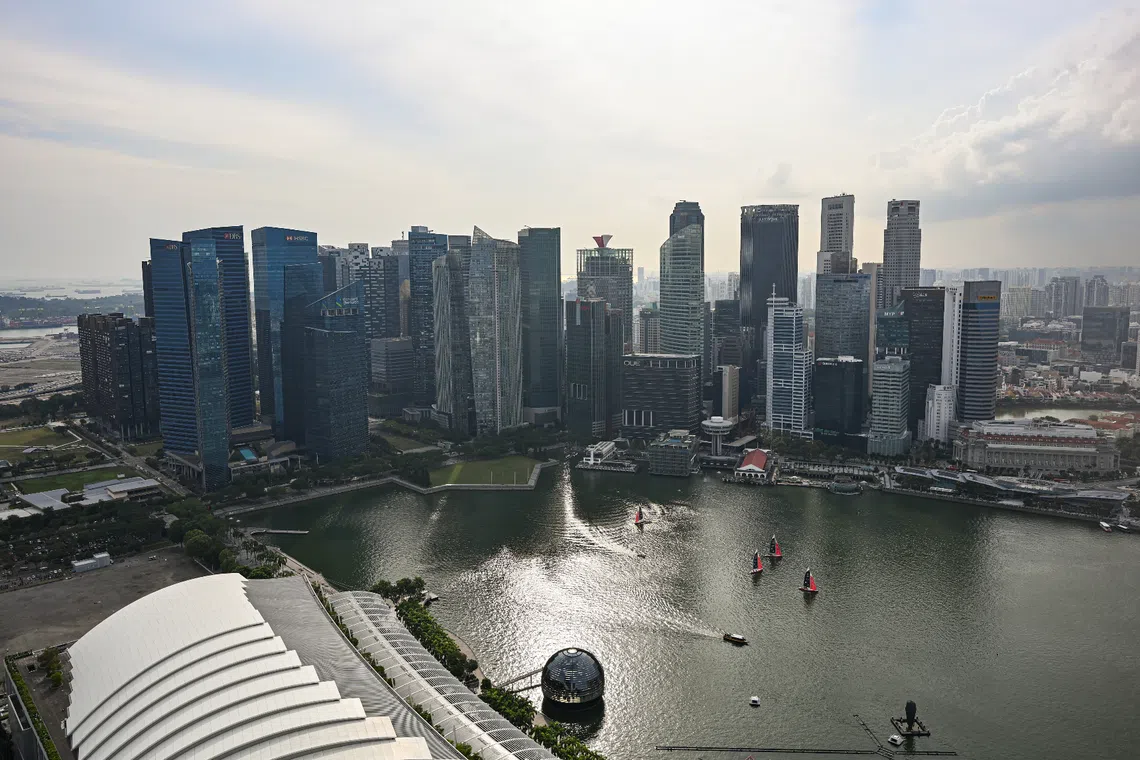Strengthening NS, bilateral ties among ministries’ plans to secure S’pore’s place in changing world
Sign up now: Get ST's newsletters delivered to your inbox

Upcoming plans for Singapore’s Foreign Affairs and Defence ministries and the National Security Coordination Secretariat were released on Sept 15.
ST PHOTO: LIM YAOHUI
Follow topic:
- Singapore will strengthen National Service by refining medical classifications and vocations, and utilising civilian expertise.
- Singapore aims to expand partnerships, including new ties with South Korea and New Zealand.
- Singapore will bolster national security by tackling emerging risks through inter-agency coordination and public education.
AI generated
SINGAPORE – To secure Singapore’s place in a changing world, the Government will strengthen national service (NS), expand partnerships with other countries and improve its national security capabilities.
These are part of upcoming plans for Singapore’s Foreign Affairs and Defence ministries, and the National Security Coordination Secretariat under the Prime Minister’s Office. They were released on Sept 15 in the ministries’ addenda to President Tharman Shanmugaratnam’s address
In his speech on Sept 5, Mr Tharman said Singapore’s first priority is to secure its home and safeguard its place in the world, and that it can never take its security for granted, “especially in an era when tensions can flare up suddenly, in the region and globally”.
Here are some of the highlights from the various addenda or public statements of each ministry’s respective plans:
Ministry of Defence (Mindef)
The Singapore Armed Forces will deploy service personnel more effectively and adopt technologies that complement and amplify their strengths. It will also refine its medical classification system, redesign vocations and roles, and provide more opportunities for operationally ready national servicemen to apply their civilian expertise, said Defence Minister Chan Chun Sing.
Mindef will establish new structures to drive the development of new capabilities, especially in advanced cyber security and unmanned platforms, as advances in technology – particularly low-cost, unmanned and dual-use systems – are redefining warfare.
New and emerging security threats present opportunities to work with like-minded countries to strengthen preparedness and collective resilience. Mindef will deepen its relevance to existing defence partners, while actively building and expanding collaborations with new ones, and also contribute to multilateral platforms and partnerships like the Asean Defence Ministers’ Meeting-Plus and the Five Power Defence Arrangements.
There will be more opportunities for volunteers of all ages, skill sets and backgrounds to contribute to national defence.
Mindef will refresh its approach to National Education, to deepen the public’s understanding of the changing external environment and Singapore’s fundamental realities, foster public support for national priorities, and strengthen commitment to defence and NS.
Ministry of Foreign Affairs (MFA)
With the world in transition from the post-Cold War order to a more uncertain era marked by disruptions to global trade, the weaponisation of economic tools, rising risks of conflicts, weakening multilateralism, sharper major power rivalry and rapid technological change, Singapore’s foreign policy must adapt swiftly, said Foreign Minister Vivian Balakrishnan. This includes maintaining consistent and pragmatic engagement with all countries, reinforcing the nation’s role as a credible and reliable partner, and looking after Singaporeans overseas and building domestic support for foreign policy.
Singapore will support the
Johor-Singapore Special Economic Zone
and theJohor Bahru-Singapore Rapid Transit System Link,
and pursue cooperation with Indonesia in new areas like renewable energy and human capital development, as constructive cooperation with Singapore’s immediate neighbours is vital.MFA will strengthen ties with both the US and China, which are important partners across many domains. It will also expand its circles of friends, including middle powers in emerging regions of growth such as Africa, Central Asia, Latin America and the Middle East. Singapore will also open new diplomatic missions in Africa and Latin America in the coming years and launch a comprehensive strategic partnership with New Zealand and a strategic partnership with South Korea.
Singapore is also exploring partnerships between the Comprehensive and Progressive Agreement for Trans-Pacific Partnership, the European Union and Asean to preserve open flows of trade and investment and build economic resilience. It is also expanding collaboration in areas such as the digital economy and green economy to create opportunities for Singaporeans.
The Republic will proactively support effective rules-based multilateralism at the United Nations and the World Trade Organisation, and continue to demonstrate its commitment to being a responsible co-steward of the global commons, through advancing positive agendas on artificial intelligence, climate change and pandemic preparedness.
National Security Coordination Secretariat
In an increasingly fragmented and dangerous world, Singapore faces growing and new security risks that threaten its national security and sovereignty, said Coordinating Minister for National Security K. Shanmugam. The secretariat will organise inter-agency work to identify, assess and mitigate national security risks spanning different domains such as infrastructure, the economy and supply chains.
The unit will work with government agencies to identify key emerging security risks that cut across various domains and assess their security implications, and develop solutions and coordinate responses to address these risks.
The secretariat also supports efforts to strengthen the public service’s capability to organise itself to respond to risks in a proactive, agile and well-coordinated manner. This covers not only operational and technological aspects, but also public education and communications.


